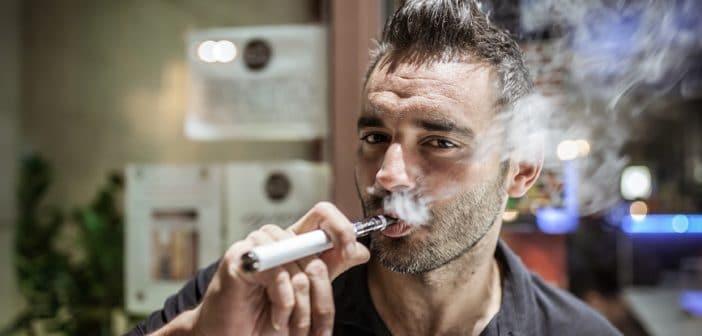This post was originally published on January 28, 2015.
Lots of people have traded in their American Spirits or Marlboro Silvers for e-cigarettes. With the many deleterious effects of smoking on their minds—and we really don’t need to list those here—many people want to quit. And if they can’t quit, or don’t want to surrender the nicotine fix for good, they’ll charge up an electronic version instead and start puffing.
The Twin of Two Evils?
But a new study published as a letter in the New England Journal of Medicine raises a genuine cause for concern. According to the study, when you inhale from electronic cigarettes at high temperatures, a noxious amount of formaldehyde can enter your lungs, more than what a regular cigarette produces. Not exactly the best news.
How it Works
E-cigarettes work by heating up a liquid to form a vapor that you can inhale, as opposed to regular cigarettes that release nicotine by burning tobacco into smoke. Right now, the FDA does not regulate e-cigarettes, so there’s no way of knowing what is and is not taking place in your lungs when you puff.
There are some e-cigarettes that allow smokers to crank up the voltage to increase the heat and amount of liquid in the vapor. This is when, according to David Peyton, a chemist at Portland State University, found a problem. He and his colleagues only tested out one brand, and they experimented with two different voltage settings.
After measuring a compound that emerges during the vapor process—formaldehyde hemicatel—they discovered that at high voltage settings, high levels of cancer-causing formaldehyde are released in the vapor, up to 15 times more than what you’d get from a regular cigarette.
A Contentious Study
The study did not involve actual humans. Instead, tests of just one brand of e-cigarettes took place in test tubes. Because of this, some researchers claim that harmful effects of e-smoking can’t yet be proven, although the study does bring cause for alarm and warrants more research.
Eric Jacobs, a biologist at the American Cancer Society, said he “was reasonably convinced” that all the formaldehyde released during the test tube studies would most likely break down into formaldehyde in e-smoker’s lungs.
But Gregory Conley, a lawyer with the American Vaping Association (i.e., a guy who certainly has the potential to be biased), calls bullshit on the study. “They used the device in a manner that no one does,” he said. Researchers cranked the voltage up high for long periods of time, and Conley says users don’t do that because it “creates a burning, acrid taste” that would inevitably make them turn down the notch. “What the researchers did is like leaving a steak on a grill all day—many cancer-causing substances might be formed but no one would eat such charred meat.”
The Cancer Action Network, an affiliate of the American Cancer Society, went on record to say that the study “should raise serious concerns” because there’s no governmental regulation on e-cigarettes, and they urged the FDA to get off their asses and finalize a proposal for regulation, which they supposedly have in the works.
Too Soon To Tell
Rumors have abounded about the risks of e-cigarettes and “vaping” for a few years, and the scare has led to a ban on using these inside restaurants or any other public places, which some believe is ludicrous, since there’s technically no second-hand smoke and you can’t even smell the vapor.
But, as the old adage goes, if it’s too good to be true, it probably is. It’s still too soon to determine if e-cigarettes really cause cancer, but until hard evidence is collected, you might want to wear the patch or chew some Nicorette instead.
Sponsored DISCLAIMER: This is a paid advertisement for California Behavioral Health, LLC, a CA licensed substance abuse treatment provider and not a service provided by The Fix. Calls to this number are answered by CBH, free and without obligation to the consumer. No one who answers the call receives a fee based upon the consumer’s choice to enter treatment. For additional info on other treatment providers and options visit www.samhsa.gov.





